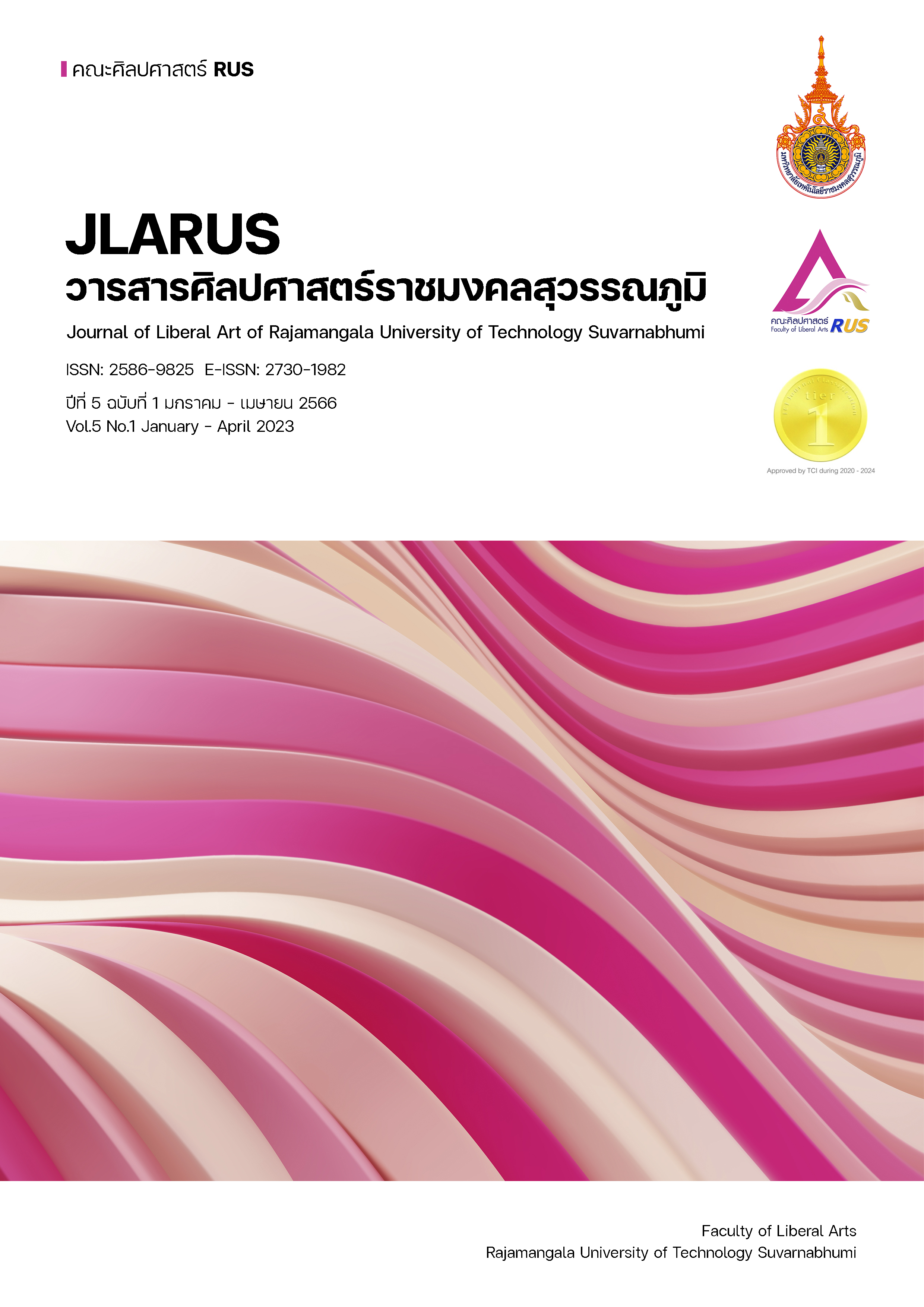THE DEVELOPMENT OF A POTENTIAL MODEL OF EXECUTIVES OF THE SMALL FOOD MANUFACTURING FACTORIES TO INCREASE COMPETITIVENESS
Main Article Content
Abstract
This article aimed to: 1) study the potential components of executives of small food manufacturing factories to increase competitiveness, 2) develop a potential model of executives of small food manufacturing factories to increase competitiveness, and 3) create a guideline manual for potential development of executives of small food manufacturing factories to increase competitiveness. This is mixed-method research with a combination of qualitative and quantitative approaches. There were four categories of informants: 1) in-depth interviews of 11 experts, 2) questionnaires collected from 402 executives, 3) focus group discussions of 14 experts, and 4) 5 experts in a guideline manual assessment. Research instruments were an in-depth interview guide, a questionnaire, and a manual assessment form. Qualitative data was analyzed by content analysis. Statistical methods for quantitative interpretation were frequency, percentage, mean, standard deviation, and factor analysis.
The research results showed that the potential of executives can be divided into components according to the type of competencies. Core competencies consisted of 14 components, while competence in food processing industry consisted of 6components affecting the potential development of executives of small food manufacturing factories. The findings led to a model of potential development that can be applied effectively and a guideline manual for potential development of executives that contained potential assessment methods and methods for potential development of executives by components. The result of the guideline manual assessment by experts showed that, in terms of suitability, the guideline manual for potential development is the most appropriate with the average score ( = 4). In terms of application, with the average score ( =4), the manual is the most suitable.
Article Details

This work is licensed under a Creative Commons Attribution-NonCommercial-NoDerivatives 4.0 International License.
References
จุฑารัตน์ ปิณฑแพทย์. (2563). การพัฒนารูปแบบศักยภาพพนักงานเข้าใหม่สำหรับธุรกิจ อุตสาหกรรมยุคเศรษฐกิจพลิกผัน. (วิทยานิพนธ์ปริญญาดุษฎีบัณฑิต). นนทบุรี: มหาวิทยาลัยเทคโนโลยี พระจอมเกล้าพระนครเหนือ.
ชลิดา ลิ้นจี่. (2563). ความสัมพันธ์ระหว่างวิสัยทัศน์องค์กรและประสิทธิภาพ การกำกับดูแลกิจการที่ดีของบริษัทมหาชนจำกัด. (วิทยานิพนธ์ปริญญาดุษฎีบัณฑิต). กรุงเทพมหานคร: มหาวิทยาลัยกรุงเทพธนบุรี.
นวรัตน์ เพชรพรหม. (2562). วัฒนธรรมองค์กรและคุณภาพชีวิตในการทำงานที่ส่งผลต่อประสิทธิภาพ
ในการปฏิบัติงานของพนักงาน บริษัท ไปรษณีย์ไทย จำกัด. (วิทยานิพนธ์ปริญญาดุษฎีบัณฑิต)
ปทุมธานี: มหาวิทยาลัยเทคโนโลยีราชมงคลธัญบุรี.
ปาหนัน เทศบรรทัด. (2562). รูปแบบการพัฒนาศักยภาพของผู้บริหารระดับกลางในอุตสาหกรรม ปิโตรเคมี. (วิทยานิพนธ์ปริญญาดุษฎีบัณฑิต). นนทบุรี: มหาวิทยาลัยเทคโนโลยี พระจอมเกล้าพระนครเหนือ.
ราชบัณฑิตยสถาน. (2556). พจนานุกรมฉบับราชบัณฑิตยสถาน พ.ศ. 2554. กรุงเทพมหานคร: นานมีบุ๊คส์พับลิเคชั่นส์.
ภัทรทิรา มุขสมบัติ. (2562). รูปแบบการพัฒนาศักยภาพผู้บริหารจัดการศูนย์บริการลูกค้าสัมพันธ์ในยุค
ดิจิทัล. (วิทยานิพนธ์ปริญญาดุษฎีบัณฑิต). นนทบุรี: มหาวิทยาลัยเทคโนโลยีพระจอมเกล้าพระนครเหนือ.
ศจีรัตน์ เมธีสุวภาพ และคณะ (2562). ศักยภาพของบุคคลในองค์กร การประเมินและพัฒนา
ศูนย์อัจฉริยะเพื่ออุตสาหกรรมอาหาร. (2564). สถาบันอาหาร กระทรวงอุตสาหกรรม. สืบค้น 25 กันยายน 2564. จาก http://fic.nfi.or.th/upload/info_graphic/pdf41.pdf.
ศิวกร อโนรีย์. (2564). ปัจจัยที่มีผลต่อความได้เปรียบทางการแข่งขัน และความสำเร็จของผู้ประกอบการวิสาหกิจขนาดกลางและขนาดย่อมในเขตจังหวัดราชบุรี. (วิทยานิพนธ์ปริญญาดุษฎีบัณฑิต). กรุงเทพมหานคร: มหาวิทยาลัยศิลปากร.
สุกัญญา รัศมีธรรมโชติ. (2548). แนวทางการพัฒนาศักยภาพมนุษย์ด้วย Competency.กรุงเทพมหานคร: ศิริวัฒนาอินเตอร์พริ้นท์จํากัด (มหาชน).
สุทธญาณ์ โอบอ้อม. (2558). การพัฒนาศักยภาพบุคลากรขององค์กรปกครองส่วนท้องถิ่นตามแนวพระพุทธศาสนา. (วิทยานิพนธ์ปริญญาพุทธศาสตรดุษฎีบัณฑิต). พระนครศรีอยุธยา: มหาจุฬาลงกรณราชวิทยาลัย.
อนิรุทธิ์ ตุลสุข. (2563). VUCA World โลกใบใหม่ที่ไร้ทิศทางชัดเจน. สืบค้น 21 กันยายน 2564. จาก https://www.coachforgoal.com/blog/topic/vuca-world-โลกใบใหม่ที่ไร้ทิศทาง.
Ansoff, I. (2010). Strategy Management. Beijing: China Machine Press.
Burack & Mathys. (1998). “Employee oriented cultures and performance”WorkingPaper.
Chicago: University of Illinois at Chicago, College of Business Administration.
Henri, F. (1949). General and Industrial Management.London:Sir Issac Pitman&Sons
Rogers, D. & David C. (2009). Strategy management. Journal of Ji Nan University.
McClelland, D. C. (1973). “Testing for Competence Rather Than for Intelligence”. American Psychologists. 28(1), 1-24.
Porter, M. E. (1990). New global strategies for competitive advantage. Planning Review, 18(3), 4-14.


